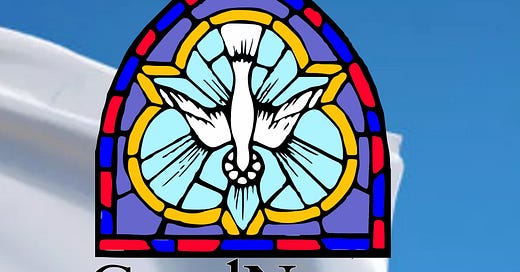Preached in 2023, published in 2025, 300 pgs. St. Paul’s Evangelical Church in Marietta, Ohio, where I currently (2025),serve as pastor continues to recover, explore, and celebrate her faithful rootage by being faithful to the love and grace of Jesus Christ. While founded in 1839 as a German speaking Reformed Evangelical church, we are thoroughly American and have been for generations. Marietta, Ohio is where we have been planted, and this is where we are blooming. We are a hearty breed, faithful to the best of the ministry of Jesus Christ. St. Paul’s was originally founded to serve it’s local community in a language that they understood: German. Today we continue to serve that same mission: St. Paul’s aims to provide Christian worship, study, and service in language that people understand. Of course this means English, but more than that. Our aim is to make the gospel and the Bible understandable to ordinary people.
This is the third collection of sermons from St. Paul’s. They are being published as part of the ongoing renewal of St. Paul’s. We are an old Church, 186 years old at the time. Founded in 1839 by German immigrants to Marietta, Ohio. Renewal is an ongoing process, one that we began a long time ago.
St. Paul’s has been part of five denominations over her history, three in the past 30 years. A lot of people have the idea that a church is planted and maintains or should maintain its general theological character forever. And that is partly true, which means that it is also partly false.
The Roman Catholic Church would have us believe that it has consistently maintained the Tradition that it began, that it has been consistently and continually faithful for over two thousand years. But actual history belies that story. In fact, the Roman Catholic Church is a conglomerate of traditions, full of ebbs and flows, ups and downs. And in fact, that is simply the truth of all history.
Compare the growth and history of any institution and you will find various ebbs and flows with two steps forward and one step back. The truth is that growth happens in spurts, and we learn from our mistakes—hopefully. At least that is the ideal, which stands more as a goal than an accomplishment.
However, institutions like to craft narratives that are positive, uplifting, and impressive in order to maintain the impression of success because such narratives help sell the institution to the public. Stories of success, worldly success, are attractive, or so we think. People like reading about success and dynamic social and business turn-arounds that are full of warm fuzzies and inspirational accomplishments.
We forget or ignore or just don’t understand that the Bible is not like that. The Bible is actually the long story of human failure. Take the Old Testament for instance. There we find the story of God who gathers a particular people and inserts Himself into their story. It began with Abraham and ended in Egyptian slavery. So God chose Moses to free His people from Pharaoh, and sent them into the wilderness, which nearly killed them. So He chose David and Solomon to build a kingdom, which became the greatest empire in the world at that time, only to fall into a civil war that lasted centuries. And it finally came to a cataclysmic end in A.D. 70 as Rome destroyed Jerusalem and the Temple, and scattered the people.
And that end was involved the beginning of the New Testament story of Jesus Christ. Jesus came to free God’s people from slavery to sin, which all of the Old Testament rules and practices failed to do. But Jesus died a convicted criminal on the cross, an instrument of horrific torture.
Are you getting the picture? The story of the Bible is horrifically tragic, except for the overwhelming, ongoing, and audacious hope that God will eventually prevail. And that is our hope at St. Paul’s! And because we share that hope, we also share in God’s tragic story of His involvement in human history. We are willing to air our laundry in public for two major reasons. First, truth is important, and our story is rough in places. We don’t have everything right, but we are working on it. And second, the Bible is our model.
Order GoodNews—Evangel 2024 and learn that Mercersburg theology is nothing new; it’s just the Protestant Reformation. See it in the Bible laid out for ordinary understanding.






Good work, Phil.